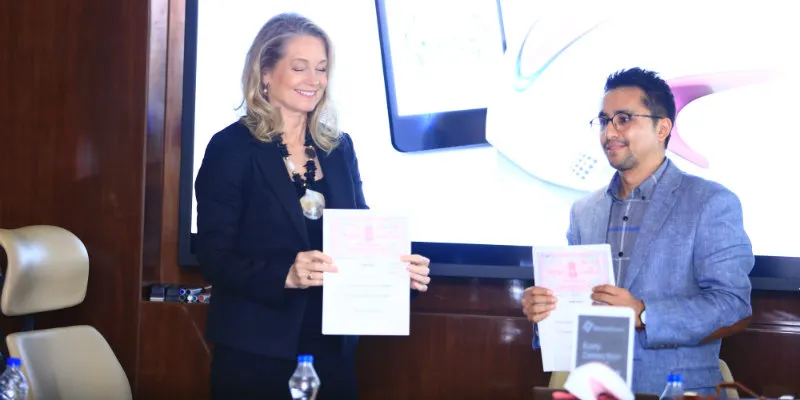GE Healthcare ties up with UE Lifesciences to distribute breast cancer detection device
UE LifeSciences Inc, a USA-India based med-tech startup, announced a distribution partnership with GE Healthcare to commercialise its iBreastExam (iBE) in countries across South Asia and Africa on Thursday.
UE LifeSciences’ affordable, high-tech iBreastExam device is effective in tackling breast cancer by making early-detection a reality, across urban and rural India. The partnership brings together UE LifeSciences' skills to design and develop mobile health innovations, and GE Healthcare's sales, marketing and distribution expertise in these markets to enable early detection of breast cancer in the developing world.
Mihir Shah, CEO and UE LifeSciences, says, “Large-scale access to early detection is the key to lowering the burden of breast cancer in the developing world. Affordable, accurate and easy-to-use primary-care tool like iBreastExam is one aspect of the solution.”
He added, “There is also a need for experienced teams across geographies that can seamlessly connect the care pathway - from primary care and women’s health to radiology, diagnostics, and oncology. Our partnership with GE Healthcare will combine the power of innovation and scale to fight breast cancer in a whole new way.”

Mihir, a computer engineer from Drexel University, pivoted his career into the healthcare domain when he learnt that entrepreneurs can license professors’ and scientists’ patented inventions and convert them into real-life products and services. Since 2005, he has worked on multiple healthcare innovations, such as assessing cardiac output in a non-invasive manner, measuring traumatic brain injury-led bleeding in the skull, among others.
In 2006, when Mihir’s mother-in-law was diagnosed with breast cancer, his curiosity around the issue piqued. When he began having conversations with friends and family, he came across at least 10 women who were suffering from breast cancer. He says, “I learnt quite quickly that there are two worlds when it comes to treating breast cancer: the developed world, which has access to early detection and treatments, and the developing world, where access to even detection remains a key challenge leading to high mortality rates.”
He later collaborated with Professor Matthew Campisi to develop iBreastExam – a hand-held, painless and radiation-free device.
It claims that over 75,000 women have been screened in the country with the help of iBreastExam and 100-plus breast cancer cases identified in partnership with 40-plus private healthcare, government institutions, non-profit and CSR initiatives.
Being a radiation-free and painless test further makes iBE suitable to women at primary care locations such as a doctor's clinic, community health centres, health camps or a hospital's out-patient department, he said.
“The partnership provides a significant opportunity to commercially scale up iBE across India, South Asia, Africa and Southeast Asia and improve breast cancer-related outcomes in these regions,” GE Healthcare Sustainable Healthcare Solutions President and CEO Terri Bresenham said.
"With the wealth of engineering talent that we have in this country, with the gap in healthcare system being out of reach, particularly for rural population, we need to play a different role. Our goal is to help bring startup companies like UE LifeSciences together with what we can provide - scaled distribution, service and support model across vast regions of the world,” she added.
IBE is a 'Made in India' device developed by a team of 20-plus scientists, engineers and clinicians with $1.3 million in grant funding from Pennsylvania Department of Health (CURE Grant), University City Science Center (QED & DHA), Drexel University (Coulter Programme) and Unitus Seed Fund (StartHealth grant).
It is currently commercially available in India, Myanmar, and Botswana.
The project has been mentored and invested by Kiran Mazumdar-Shaw of Biocon, Dr. Ranjan Pai of Manipal Education and Medical Group and Unitus Seed Fund, a social impact investor in affordable healthcare innovations.
Present at the occasion on Thursday, Kiran stressed on the need to "downstage" cancer, saying it is a difficult task as most people only go for diagnosis when it is too late.
Stating that innovations like iBreastExam should be made a standard of care, she said, “The moment you downstage cancer and you detect it early it converts from cancer care to cancer cure. I think governments also need to adopt this because when we look into diagnosis and diagnostics that is about preventive healthcare."
There is a huge need to detect cancer at an early stage as more lives are being lost to breast cancer in India than any other country in the world. Kiran said, “It is not only the most commonly occurring cancer in India, it occurs in one in 28 women over their lifetime, and of that half, the cases were in women under 50 years of age.”







